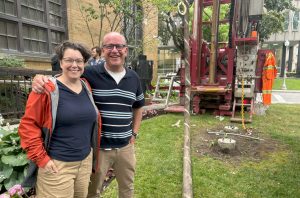So profoundly moved by his resolve, so overwhelmed by feelings of pride and even by a sense of personal moral indebtedness to him for his courage, many people actually named their children after him. The mere mention of his name often evoked sighs of appreciation and images of biblical grandeur.
Theodor Herzl was born 150 years ago on May 2 (Iyar 10). His life, alas, was too brief, for he died at the age of 44. But the intersection of his life and the line of Jewish history shattered the geometry of ordinary events. The Jewish future would soon tip on a new fulcrum.
Eight years before his death, in February 1896, he published his seminal work Der Judenstaat (The Jewish State). The nub of this small book was a call for the Jews of the world to become sovereign in their own land. His words ignited the low-burning embers in the smouldering Jewish heart, where a return to the historic homeland was already being discussed. And where the discussion had not yet started, he set it in motion.
One year later, in September 1897, Herzl organized and galvanized the first Zionist Congress in Basel, Switzerland. He electrified the assembled delegates. “A people can be helped only by itself; and if it cannot do that, then it cannot be helped.”
In A History of Zionism (Schocken Books, New York 2003), Walter Laqueur described how the message was received. “Herzl was greeted with tremendous applause lasting 15 minutes.” The occasion “was a milestone in modern Jewish history.”
The non-Jewish world now knew that national Jewish consciousness was stirring.
The Jewish world now had a beacon to cast light into an unclear future. From that moment forward, untold millions of Jews looked with tearful eyes and yearning hearts toward its glow. It became their hope for a safer, better, freer future.
Herzl was jubilant after the congress. He recorded the following notation in his diary. “If I were to sum up the congress in a word – which I shall take care not to publish – it would be this. At Basel, I founded the Jewish state. If I said this out loudly today I would be greeted by laughter. In five years, perhaps, and certainly in 50 years, everyone will perceive it.”
He was prophetic.
Fifty years and nine months after he wrote those words, the Jews of Mandatory Palestine – knowing that by doing so they would have to fight to save their lives and their national dream – proclaimed the State of Israel.
For eternity now may it exist. And for eternity too may we always acknowledge the good that Theodor Herzl did for his people and indeed, for the world.






